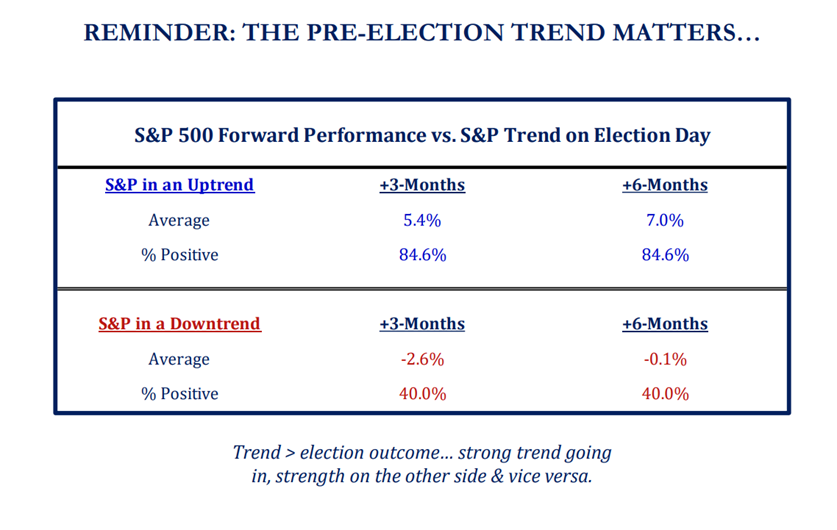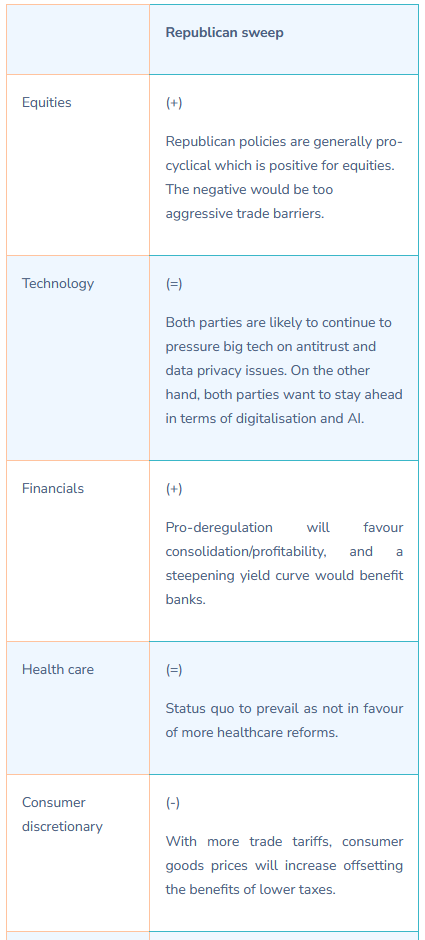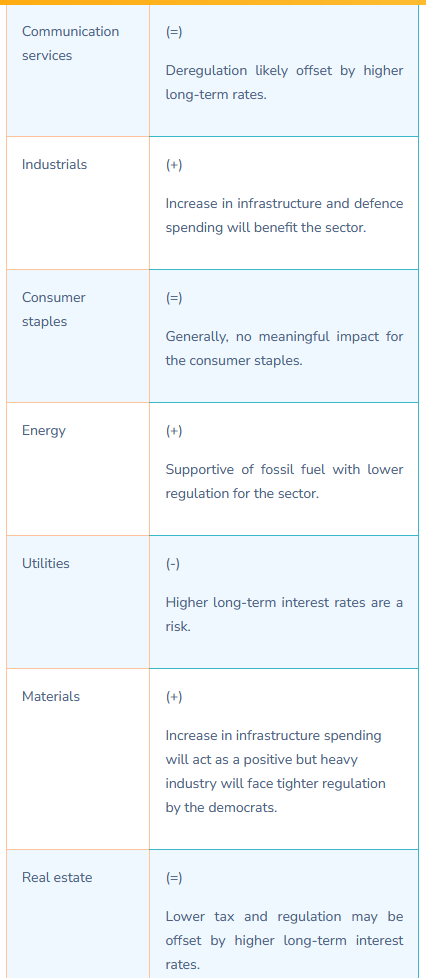Donald Trump won the election by a clearer and wider margin than what was expected, and the Republicans gained control of the Senate.
In the short-term, we believe this outcome is likely to be positive risk assets for 3 reasons. First, history shows that once a key political event is behind us, markets tend to lean in the direction of the trend. I.e. the current bull markets might get extended.

Source: Srategas
Second, investors bought some protection ahead of the event (put/calls spiked sharply the last few days, hedge funds reduced their net exposure, etc.) and now that the outcome of the election known, they are closing their shorts and/or protection. Third, the market is probably front-running the possible consequences of Donald Trump election and possible “sweep” Republican victory. The bear steepening of the yield curve today (i.e. U.S. Treasury yields rising across the curve but more on the long-end) signals that investors believe in higher nominal growth going forward and this is positive equities.
In the medium to long-term, we forewarn investors that today’s political outcome should be very carefully analysed, as it is likely to have far-reaching consequences on the macro-economic, monetary policy and asset classes performance.
There are indeed six key policy areas in play: fiscal policy, regulatory policies, trade policy, immigration policy, geopolitical policy and monetary policy.
The last one is supposed to be independent, and changes on the first two require agreement among the president and both houses of Congress. Large policy shifts in these areas will therefore only be likely if the Republicans score a sweep. By contrast, the future president has a lot of room to affect trade policy, immigration policy, and geopolitical policy, regardless of Congress.
At the moment of publication, the House is still up for grabs, but the prospects for Republicans winning the House of Representatives are promising. So, for the remainder of this report we assume a Republican clean sweep.
Fiscal Policy
With a unified Republican government, the U.S. fiscal policy under Trump will focus on expansive tax cuts (for corporate and households), alongside increased government spending. Building on the 2017 Tax Cuts and Jobs Act, which lowered the corporate tax rate from 35% to 21%, Trump has proposed further reductions to as low as 15% for corporations, along with additional tax relief for individuals. This would increase disposable income for households and potentially boost corporate earnings, fuelling economic growth in the short term.
However, such cuts, especially if not offset by spending reductions, could widen the fiscal deficit considerably. According to the Committee for a Responsible Federal Budget, Trump's proposals could add $7.75 trillion to the national debt by 2035. Trump's potential focus on defence and infrastructure projects would require substantial federal spending, adding to the deficit.
Overall, this is positive for U.S. GDP growth and U.S. companies’ earnings. However, this is negative for the U.S. public deficit and debt trajectory. As it was the case in the U.K. back in 2022, bond markets could get nervous and have a disciplining effect on the next administration.
Potential market effects:
- Equities: Lower taxes could increase after-tax corporate earnings, especially benefiting sectors such as technology and finance, potentially pushing stock prices higher. However, inflationary concerns and potential monetary tightening could weigh on equity valuations.
- Interest rates and bonds: The increase in government debt could push long-term interest rates higher, influencing borrowing costs for corporations and consumers.
- FX markets: larger fiscal deficits may weaken the dollar due to concerns about the U.S. fiscal situation. However, higher interest rates might attract foreign capital seeking higher yields
Regulatory Policies
The new Trump administration envisions to deregulate aggressively. In the energy sector, the new Trump administration is likely to expand fossil fuel production at the expense of renewable energy. In the financial sector, Trump seeks reduced oversight.
Potential market effects:
- Equities: Energy and financial stocks could benefit from lower compliance costs
- Gold: Greater uncertainty about the regulatory environment, along with inflation concerns, might boost demand for gold as a hedge against economic uncertainty and inflation.
- Oil: “Drill baby drill” deregulation policy might lead to increased U.S. oil production and thus lower oil prices.
Trade Policy/Tariffs
A 10% baseline tariff on all imported goods, and a targeted 60% tariff on goods from China, are among Trump’s suggested policies. His goal is to reduce trade deficits and encourage domestic production. But retaliatory measures from trading partners could ignite a trade war, with inflationary consequences. There is a caveat though; Trump is a dealmaker and might have used this rhetoric as a negotiation tool. He is pragmatic and may very well understand that trade war could create significant downside risks on growth and upside risks on inflation.
The reshoring theme (which has been developing under Biden) is likely to be reinforced under Trump. He aims to bring manufacturing jobs back to the U.S. by imposing tariffs and incentivising companies to move production domestically. This could mean increasing costs for U.S.-based companies reliant on global supply chains, particularly in sectors like technology and automotive.
Potential market effects:
- Equities: Companies reliant on imports, especially from China, would face higher input costs due to tariffs, reducing profit margins. However, domestic sectors (with limited foreign competition) might benefit
- FX markets: Protectionist trade policies could lead to a stronger dollar.
- Commodities: Trade disruptions could affect commodity prices due to supply chain bottlenecks.
Immigration Policies
Trump’s immigration policies include measures such as mass deportations and stricter border controls. This could lead to labour shortages in industries dependent on immigrant labour. Reduced labour supply could increase wages (and thus inflation). It could also affect profit margins in some sectors.
Potential market effects:
- Equities: Industries heavily reliant on low-cost immigrant labour might see reduced profitability due to increased labour costs.
- FX Markets: A weaker labour market might lower the dollar's attractiveness as an investment
Geopolitical Policies
Trump’s “America First” foreign policy stance is likely to impact international relations, especially with China but also Europe.
Potential market effects:
- Equities: Geopolitical tensions could lead to higher equity volatility
- Safe-haven assets: Heightened geopolitical tensions often drive investors towards safe-haven assets such as gold, U.S. Treasuries, the Swiss Franc or even the Bitcoin.
Monetary Policies
While the Federal Reserve operates independently, fiscal policy is likely to have significant consequences on monetary policy.
With higher demand stemming from tax cuts and higher government expenditure, coupled with tariffs. inflation might rise. This could lead to a more hawkish monetary policy.
Potential market effects:
- Interest rates: The Federal Reserve may respond to rising inflation by tightening monetary policy. This would increase borrowing costs and mortgage rates, impacting the real estate sector.
- Bonds: Investors may demand additional yields to counter inflation risks, particularly in the long-end of the curve.
- Equities: Higher interest rates would affect certain sectors like utilities and real estate. Higher bond yields could weigh on long duration sectors such as technology.
Investment Conclusions
A Trump victory in the 2024 election with a Republican-controlled Congress would likely lead to substantial shifts in fiscal, trade, regulatory, immigration, geopolitical and monetary policies.
The combined effects of the policies of Trump II
- Overall positive for U.S. equity markets, especially positive for financials (deregulation), industrials and materials (higher infrastructure spendings) and energy. It is potentially negative for Consumer discretionary (due to higher inflation and tariffs) and utilities (due to higher rates). The impact on non-US equities depends on developments on tariffs and likely retaliation measures by other economies.
- On the international equities side, Trump is negative for countries with significantly exposed to trade with the U.S. (China, Europe, Mexico, Canada, etc.). Friendshoring countries such as India and Vietnam may likely continue to thrive.
- U.S. rates are likely to be higher than previously expected, especially if Republicans gain the House of Representatives. We are likely to see less Fed rate cuts as downside risks to growth diminish and inflationary pressures are revived. We expect upward pressure on long-term rates due to higher nominal growth prospects + elevated and rising public deficits and public debt. A bear steepening of the yield curve is the most likely scenario if a Republican sweep is confirmed.
- On the Forex side, there are potentially mixed effects on the dollar, as fiscal concerns need to be balanced with yield-driven capital inflows. The Swiss Franc is likely to appreciate further against most fiat currencies.
- Commodities: There are mixed signals for oil. Gold and store of values might benefit as persisting inflationary pressures and monetary debasement caused by rising public deficits strengthen further the case for real assets as a store of value.
- Cryptos: Trump is the first crypto-friendly administration. We will address this topic in a separate note.
Sector Preferences


Sources: ECR Research, Gavekal, Strategas
